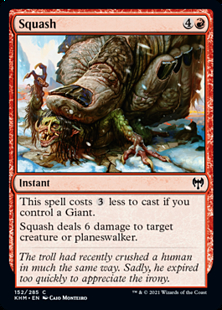 $0.09 @ TCGplayer
$0.09 @ TCGplayer
This spell costs {3} less to cast if you control a Giant.
Squash deals 6 damage to target creature or planeswalker.
If you control more than one Giant, Squash’s cost is reduced by only {3}.
Once you announce that you’re casting Squash, no player may take other actions until the spell’s been paid for. Notably, players can’t try to change the cost by removing your Giants.